13 Types of Black Birds in Arizona (With Pictures)
Last Updated on
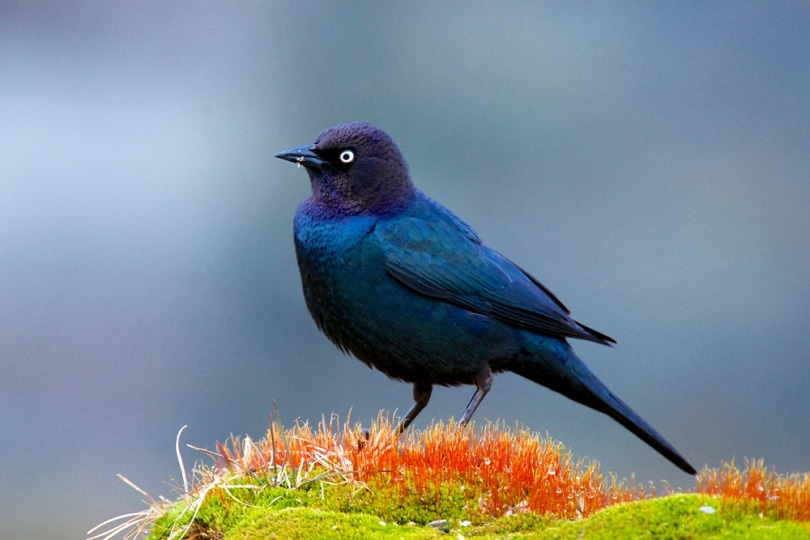
If you are new to birdwatching or are just trying to identify what birds are visiting your yard, there are quite a few black birds that you should be aware of in Arizona.
We highlighted 13 of them here. Some of these birds are black from beak to tail feathers, while others only have splashes of black on their bodies. We break it all down for you here.

The 13 Types of Blackbirds in Arizona
1. Red-Winged Blackbird
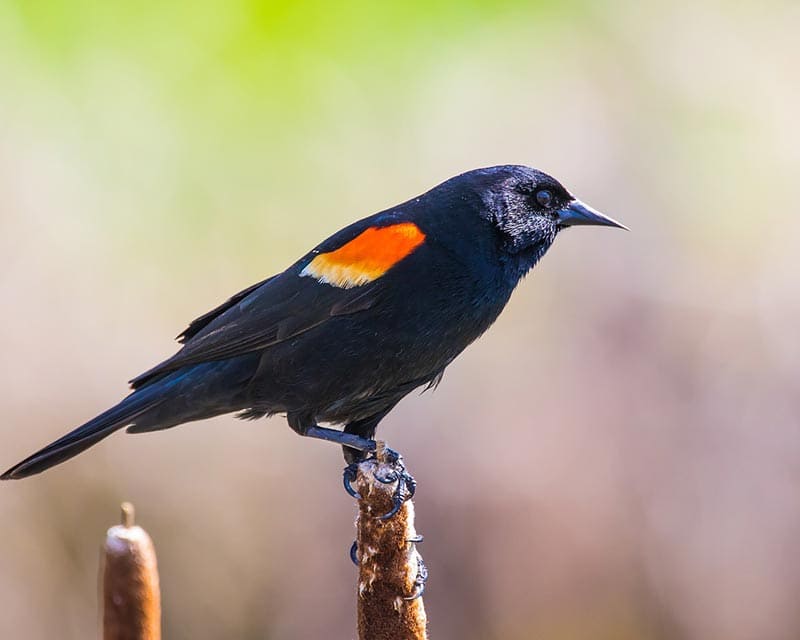
| Scientific Name: | Agelaius phooeniceus |
| Population: | 210 million |
| IUCN Status: | Least Concern |
| Time in Arizona: | Year-round |
One of the most common black birds in Arizona is the red-winged blackbird. But a more accurate name would be “red-shouldered.”
The red-winged blackbird only has a splash of color on the tops of its wings. Most of it is red, but there’s also a touch of yellow there. The rest of the bird is completely black, making it one of the most noticeable and easily identifiable blackbirds in Arizona.
2. Great-Tailed Grackle

| Scientific Name: | Quiscalus mexicanus |
| Population: | 8.2 million |
| IUCN Status: | Least Concern |
| Time in Arizona: | Year-round |
There are a few different grackle species in Arizona, but one of the most identifiable is the great-tailed grackle. This bird has an impressive large black tail.
The entire bird is black, but you might catch a tinge of purple around the head if the sunlight hits it the right way. You can find these beautiful black birds in Arizona year-round.
3. Brewer’s Blackbird
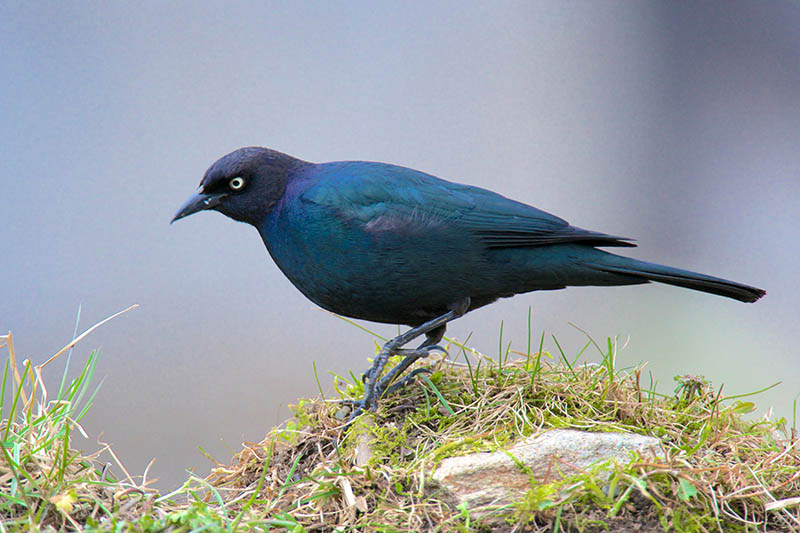
| Scientific Name: | Euphagus cyanocephalus |
| Population: | 23 million |
| IUCN Status: | Least Concern |
| Time in Arizona: | Nonbreeding/year-round |
This might not be the most impressive black bird in Arizona, but it is one of the most common, especially during the winter months. It has a year-round presence in the northern half of the state, but if you venture farther south, you will only find it there during the cooler months.
It’s a small bird that’s completely black, with metallic flecks that you can spot in the sun. It has small beady eyes and a pointy black beak.
4. European Starling

| Scientific Name: | Sturnis vulgaris |
| Population: | 200 million |
| IUCN Status: | Least Concern |
| Time in Arizona: | Year-round |
The European starling is an invasive species across the entire United States, but it has no problem thriving now that it’s here. These are larger black birds, with flecks of green, white, purple, and brown throughout their feathering.
They have sharp yellow beaks and drive off local birds to establish their territory. Most people view the European starling as a pest bird.
5. Brown-Headed Cowbird
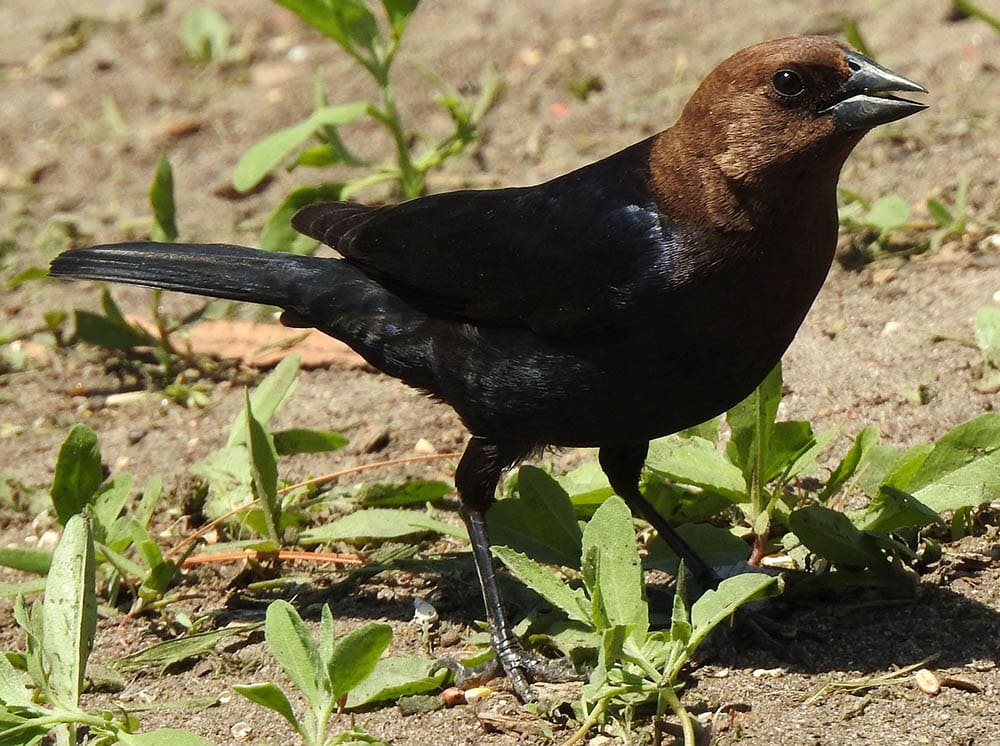
| Scientific Name: | Molothrus ater |
| Population: | 120 million |
| IUCN Status: | Least Concern |
| Time in Arizona: | Breeding/year-round |
Brown-headed cowbirds are interesting birds in that they don’t have any nests of their own. Instead, they drop their eggs in the nests of other birds, which raise the chicks as their own.
If you spot a black brown-headed cowbird, you’ve spotted a male, but it will sometimes have a blue tinge to its feathers.
6. Yellow-Headed Blackbird
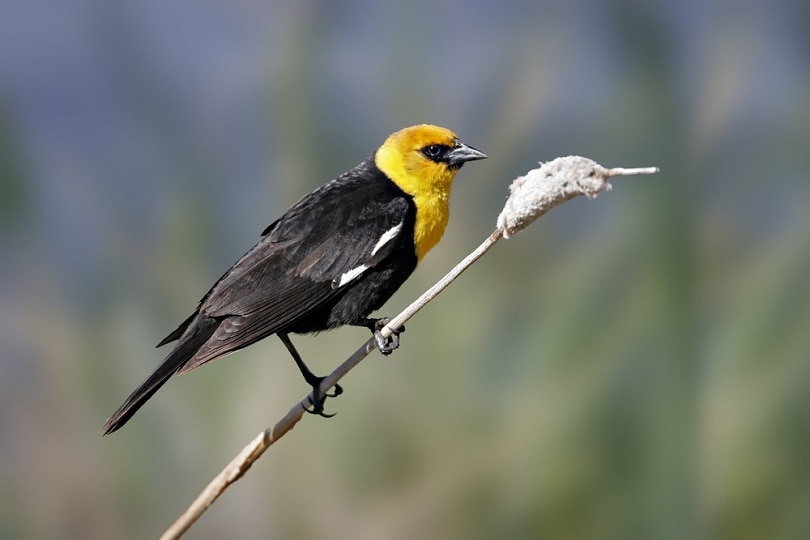
| Scientific Name: | Xanthocephalus xanthoscephalus |
| Population: | 23 million |
| IUCN Status: | Least Concern |
| Time in Arizona: | Nonbreeding, migration, and breeding |
The title of the most beautiful black bird in Arizona might just belong to the yellow-headed blackbird. While its wings, back, and tailfeather are all black, its head is a bright yellow that contrasts beautifully with the rest of its body.
The shoulders of this beautiful bird do have touches of white, but you can only see them when it’s in flight. Still, the yellow head is what makes this bird so distinguishable. When you can see these birds, though, depends on where you live in Arizona, as they live in different parts of the state at different times throughout the year.
7. Bullock’s Oriole

| Scientific Name: | Icterus bullockii |
| Population: | 7 million |
| IUCN Status: | Least Concern |
| Time in Arizona: | Migration/breeding |
When you see a Bullock’s oriole, you may not think “black bird.” But there’s no denying its black coloring. Its underbody and face are orange, but it has black wings and black along its head and chin.
You can only see these birds in Arizona during the warmer months or when they’re migrating through.
8. Hooded Oriole
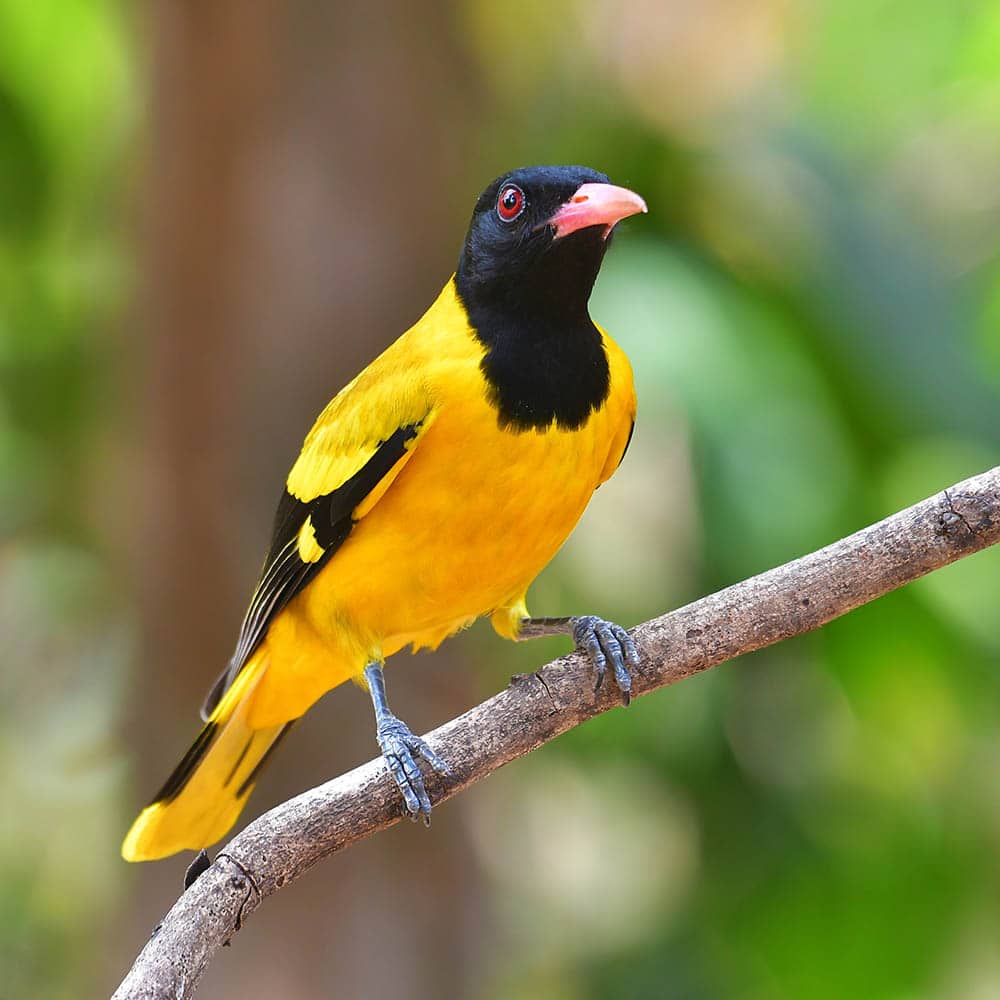
| Scientific Name: | Icterus cucullatus |
| Population: | 700,000 |
| IUCN Status: | Least Concern |
| Time in Arizona: | Breeding |
The hooded oriole is an oriole bird that you can see in Arizona during the summer months. It has a pointier beak and longer body than the Bullock’s Oriole, but the overall coloring is similar.
However, with an estimated total population of fewer than 1 million birds, these aren’t exactly the easiest birds to spot in Arizona.
9. Bronzed Cowbird

| Scientific Name: | Molothrus aeneus |
| Population: | Unknown |
| IUCN Status: | Least Concern |
| Time in Arizona: | Breeding/year-round |
The bronzed cowbird steals the nests of other birds, and if you spot a black bronze cowbird, you found a male. Bronzed cowbirds visit southeastern Arizona during the breeding season, but you can also find them in other parts of the state year-round.
These birds have bright red eyes, and while they’re mainly black, their wings do have tinges of blue and purple throughout as well. While the exact population number of these birds is unknown, their population isn’t declining.
10. Scott’s Oriole

| Scientific Name: | Icterus parisorum |
| Population: | 4.9 million |
| IUCN Status: | Least Concern |
| Time in Arizona: | Breeding |
Unlike other orioles that have more orange in their coloring, the Scott’s oriole has a distinct yellow appearance. It’s also far blacker compared to most other oriole birds.
Its entire head is black, as are its chest, tail feathers, and wings. It contrasts sharply with the yellow throughout the rest of its body. You can find these oriole birds in Arizona during the summer months.
11. Western Meadowlark
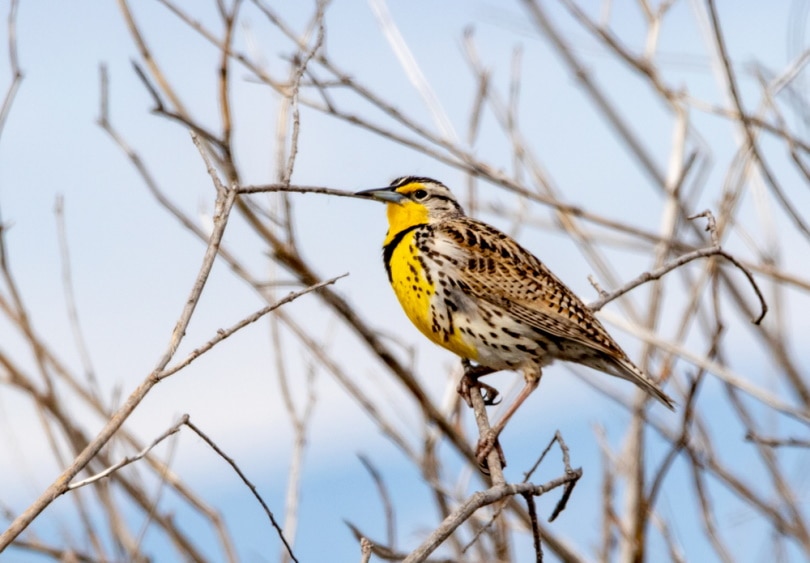
| Scientific Name: | Sturnella neglecta |
| Population: | 100 million |
| IUCN Status: | Least Concern |
| Time in Arizona: | Year-round/non-breeding |
While the western meadowlark does have black coloring on its body, it’s not really a “black bird.” Still, if you only catch a glimpse of them, all you might notice is the black paired with the yellow coloring.
These birds are brown, gray, black, and yellow, and you can find them in portions of Arizona throughout the entire year.
12. Eastern Meadowlark
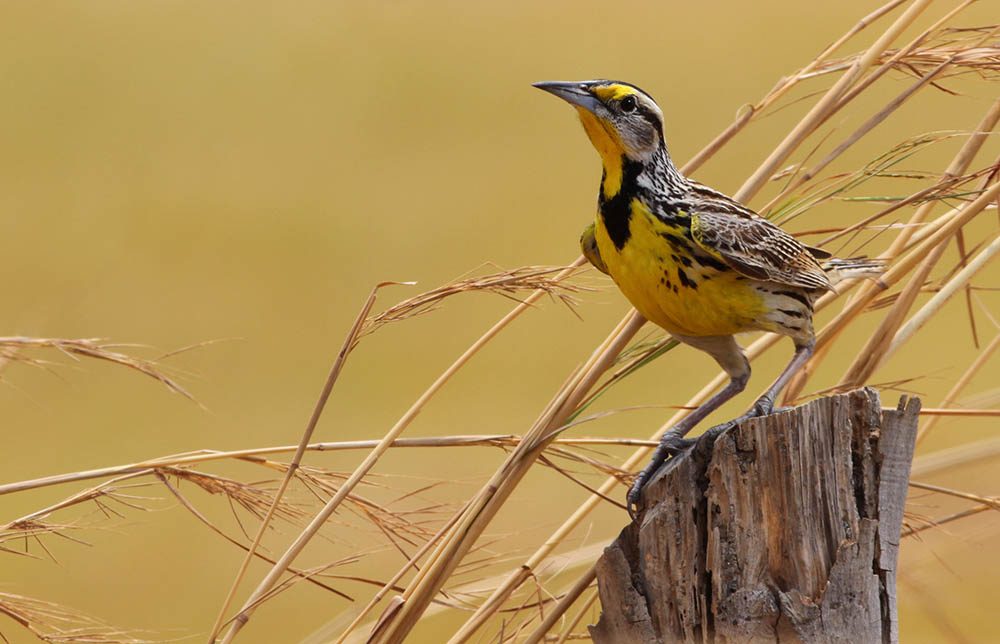
| Scientific Name: | Sturnella magna |
| Population: | 37 million |
| IUCN Status: | Least Concern |
| Time in Arizona: | Year-round/nonbreeding |
Few states have both the western meadowlark and the eastern meadowlark, but since Arizona is at the end of both of their ranges, you get to see both birds in the state.
They’re extremely similar looking, but the eastern meadowlarks don’t have a yellow malar region. It’s a small distinction, and unless you know much about birds, you’re not likely to notice the difference when you see them.
13. American Crow
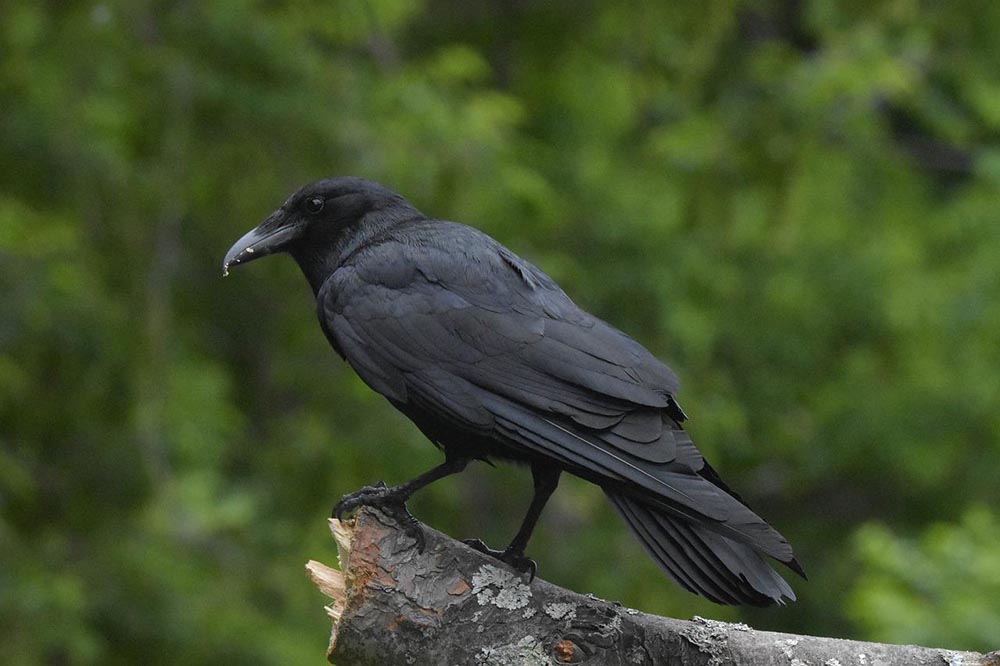
| Scientific Name: | Corvus brachyrhynchos |
| Population: | 31 million |
| IUCN Status: | Least Concern |
| Time in Arizona: | Year-round |
The American crow is a staple of cities across the United States, and Arizona is no different. These large black birds thrive anywhere near humans, and you can typically spot them in cities, suburbs, and even parks.
They live in Arizona year-round, but if you head to the most southern point of the state, they are less common because they don’t typically venture quite that far south, even during the cooler months.

Conclusion
Now that you know more about the different blackbirds in the state, perhaps you can identify exactly what you’re looking at the next time that you see one. If you’re on the hunt for a specific one, now you know what time of year to keep your eyes out for it!
Related Read: 10 Types of Black Birds in Oklahoma (with Pictures)
Featured Image Credit: Danita Delimont, Shutterstock
Table of Contents
About the Author Robert Sparks
Robert’s obsession with all things optical started early in life, when his optician father would bring home prototypes for Robert to play with. Nowadays, Robert is dedicated to helping others find the right optics for their needs. His hobbies include astronomy, astrophysics, and model building. Originally from Newark, NJ, he resides in Santa Fe, New Mexico, where the nighttime skies are filled with glittering stars.
Related Articles:
Monocular vs Telescope: Differences Explained (With Pictures)
10 Types of Hummingbirds in Arkansas (With Pictures)
8 Types of Hummingbirds in Nebraska (With Pictures)
5 Types of Hummingbirds in Idaho (With Pictures)
3 Types of Hummingbirds in Mississippi (With Pictures)
8 Types of Hummingbirds in Kansas (With Pictures)
5 Types of Hummingbirds in West Virginia (With Pictures)
5 Types of Hummingbirds in Ohio (With Pictures)
